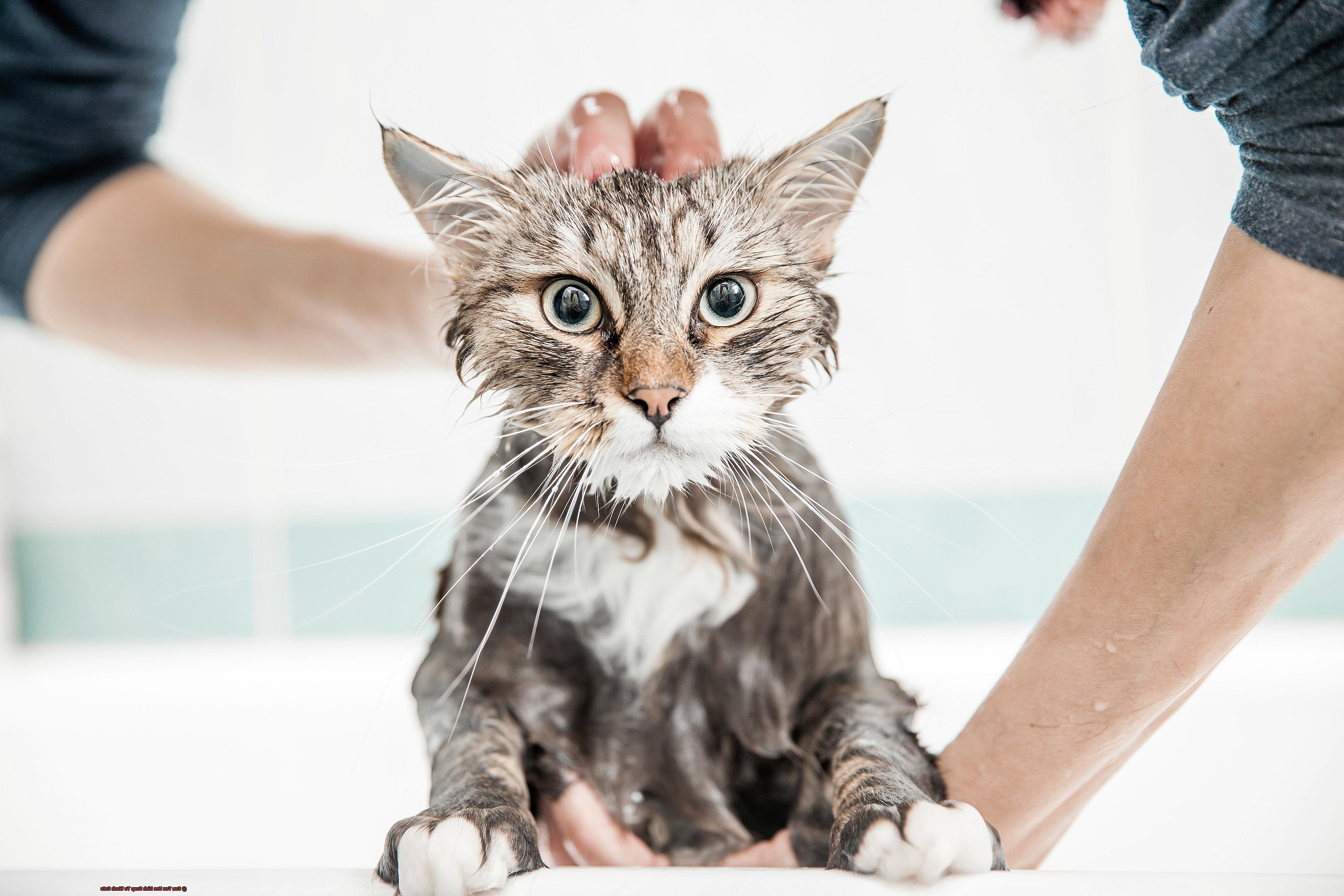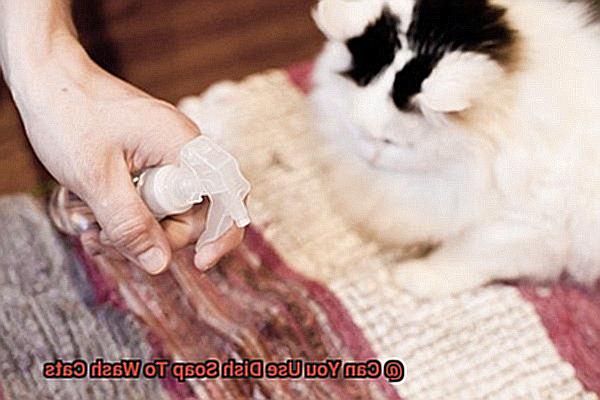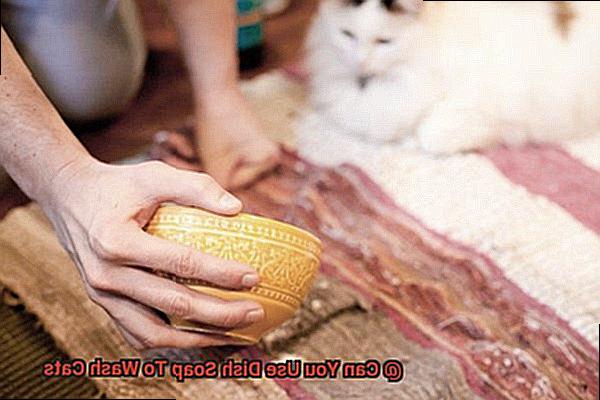Cats are renowned for their cleanliness, but sometimes even the most fastidious feline can benefit from a good scrub. Whether they’ve been rolling in the dirt or playing in something sticky, it’s up to us as responsible pet owners to keep our furry friends clean and fresh. But when it comes to choosing a cleaning solution, is dish soap really a safe and effective option?
It’s a question that many cat owners have asked themselves, and for good reason. After all, dish soap is a household staple that we use to tackle tough grease and grime on our dishes. And if it’s gentle enough for our skin, surely it’s gentle enough for our cats? Well, not necessarily.
In this blog post, we’ll dive into the pros and cons of using dish soap on your cat. We’ll explore what kind of dish soap is safe to use and how to properly wash your feline friend with it. Plus, we’ll take a look at some other cat-safe shampoo options available on the market.
By the end of this post, you’ll be equipped with all the information you need to make an informed decision about whether or not dish soap is right for your kitty. So let’s get started and find out more about this common household item.
What is Dish Soap?
Dish soap, also known as dishwashing liquid or detergent, is a versatile cleaning product that is commonly used to remove grease and grime from dishes and kitchenware. It is a thick and viscous liquid that contains surfactants, which are compounds that help to break down stubborn substances like oils and fats.
But before you reach for that bottle of dish soap to wash your feline friend, there are some important things to consider. Dish soap can be harmful to cats as it can strip their fur of natural oils, leading to dry and itchy skin. Some dish soaps also contain harsh chemicals that can cause skin irritation, eye irritation and other adverse reactions in cats.
Therefore, it is best to use a shampoo that is specifically formulated for feline use. These shampoos are gentle on your cat’s skin and coat, and they are designed to effectively remove dirt, debris, and parasites from the fur.
When choosing a cat shampoo, look for products that are free from harsh chemicals like sulfates and parabens. These ingredients can cause dryness and irritation in your cat’s skin. Instead, opt for shampoos that contain natural ingredients like oatmeal or aloe vera, which can soothe and moisturize your cat’s skin.
It is also important to dilute the shampoo with water before applying it to your cat’s coat. This will help to minimize the risk of skin irritation or other adverse reactions. Always follow the instructions on the label carefully when using any pet grooming product.

Is Dish Soap Safe for Cats?
When it comes to bathing your cat, using dish soap as a substitute for cat shampoo is not the answer.
While dish soap is designed to break down grease and oil, it can also strip away the natural oils that keep your cat’s skin and coat healthy. This can lead to dryness, itching, and other skin problems that can cause discomfort for your furry friend. Using dish soap on your cat can also be dangerous because many of these soaps contain harsh chemicals that are toxic to cats if ingested or absorbed through their skin. Ingredients such as sodium lauryl sulfate and fragrances can cause irritation and allergic reactions in cats.
Instead of risking your cat’s health with dish soap, opt for a gentle cat shampoo that is specifically formulated for their sensitive skin. Look for products with natural ingredients like oatmeal or aloe vera that can help soothe and moisturize their coat without causing any harm.
Not only will using a cat-specific shampoo help prevent skin problems, but it will also ensure that your cat smells great and feels soft. Plus, you’ll have peace of mind knowing that you’re doing right by your furry friend.
Potential Dangers of Using Dish Soap on Cats
Using dish soap to bathe your kitty is not only ineffective but also poses potential dangers to their health.
Dish soap, while effective at cleaning dishes and surfaces, contains harsh chemicals that can cause irritation to a cat’s skin, eyes, and respiratory system. These chemicals can lead to skin irritation, itching, and even open sores. Additionally, cats are known to lick themselves clean, and ingesting dish soap can be toxic and cause gastrointestinal problems.
Another danger of using dish soap on cats is that it can strip away their natural oils from their skin, leaving it dry and vulnerable to infection. This is especially concerning for cats with pre-existing skin conditions or allergies. Furthermore, the pH level of dish soap is different from that of cat shampoo, which can cause imbalances in your cat’s skin pH levels.
The potential hazards don’t end there. Dish soap can also cause eye irritation and damage if it comes into contact with your cat’s eyes. It’s not designed for use around the eyes, so getting it in their eyes can lead to redness, swelling, and even corneal ulcers.
To keep your cat healthy and happy, it’s important to avoid using dish soap on them. Instead, opt for a gentle cat shampoo with natural ingredients like oatmeal or aloe vera that won’t strip away their natural oils or irritate their delicate skin. Additionally, consulting with your veterinarian about the best grooming products to use on your cat is always a good idea.
Alternatives to Dish Soap for Washing Cats
Using dish soap to wash your cat might not be the best option as it contains harsh chemicals that can strip away their natural oils and cause skin irritation. Fortunately, there are several alternatives to dish soap that can effectively clean your cat’s fur while keeping it healthy and shiny.
- Pet-specific Shampoo: One of the best alternatives to dish soap is a pet-specific shampoo, which is formulated with gentle ingredients that won’t harm your cat’s delicate skin or coat. When selecting a shampoo, ensure it is pH-balanced and free from harsh chemicals like sulfates and parabens. It’s also essential to choose a shampoo specifically designed for cats because their sensitive skin requires different care compared to dogs or humans.
- Waterless Shampoo: If your cat hates water, a waterless shampoo might be the perfect solution for you. These shampoos come in spray form and are designed to be applied directly to your cat’s fur, eliminating the need for water. They work by absorbing oils and dirt from the fur, leaving it clean and smelling fresh. Waterless shampoos are ideal for cats who don’t enjoy baths or for quick touch-ups between washes.
- Homemade Remedies: If you prefer a natural approach to cat grooming, several homemade alternatives can replace dish soap. One popular option is an apple cider vinegar rinse that helps remove dirt and grime while balancing your cat’s pH levels. To make the rinse, mix equal parts apple cider vinegar and water and apply it to your cat’s fur after shampooing.
Another homemade alternative is a baking soda paste that can remove stubborn stains and odors from your cat’s fur. To make the paste, mix baking soda with enough water to form a thick paste and then apply it to the affected areas of your cat’s fur. Let it sit for a few minutes before rinsing it off with warm water.
Benefits of Using a Feline-Specific Shampoo
Using dish soap or a shampoo not specifically designed for cats can actually harm their skin and fur. That’s where using a feline-specific shampoo comes in.
One of the primary benefits of using a feline-specific shampoo is that it is formulated to suit the unique pH levels of cats. Cats have more acidic skin than humans, which means that using a shampoo designed for humans or even dish soap can throw off the balance of their skin’s acid mantle. This can lead to dryness, irritation, and even infection. By using a shampoo specifically made for cats, you can maintain the natural balance of their skin and keep them looking and feeling their best.
Another advantage of using a feline-specific shampoo is that it is made with cat-friendly ingredients. These shampoos are free of harsh chemicals that can irritate your cat’s skin and eyes, ensuring that bath time is a comfortable experience for your furry friend. Many feline shampoos also contain ingredients like aloe vera and oatmeal, which help to soothe and moisturize your cat’s skin and coat.
In addition to keeping your cat clean and healthy-looking, using a feline-specific shampoo can also help prevent fleas and ticks. Some shampoos contain natural flea-repelling ingredients like cedar oil or neem oil, which can help keep your cat’s fur free from pests. Regular use of these shampoos can reduce the risk of infestations and keep your home flea-free.
Finally, using a feline-specific shampoo can be a bonding experience between you and your cat. While bath time can be stressful for cats, using a gentle shampoo designed specifically for their needs can help make the experience more pleasant for them. It also gives you an opportunity to spend quality time with your cat and show them some love and attention.
How to Choose the Right Cat Shampoo
Maintaining your feline friend’s health and hygiene is crucial, and choosing the right shampoo plays a huge role in achieving that. With so many options available, it can be overwhelming to choose the right one. Here are some factors to consider when selecting the perfect cat shampoo.
- Cat’s Skin Type: Just like humans, cats have different skin types. It’s crucial to identify your cat’s skin type before choosing a shampoo. If your cat has sensitive skin, look for a gentle shampoo that is free of fragrances and other harsh chemicals. On the other hand, if your cat has oily skin, consider a stronger formula to combat excess oil.
- Ingredients: The ingredients in the shampoo you choose are vital to your cat’s health. Look for shampoos made with natural ingredients and avoid those with harmful chemicals like sulfates, parabens, and artificial fragrances. These chemicals can irritate your cat’s skin and cause allergic reactions.
- Flea and Tick Prevention: If your cat spends time outdoors or has a flea or tick problem, look for shampoos that contain flea and tick repellent ingredients such as pyrethrin or permethrin. This will help keep your cat safe and healthy.
- pH Balance: A cat’s skin has a natural pH balance of around 7.0. Choosing a shampoo that is pH balanced is essential to avoid disrupting this balance, which can cause skin irritation and dryness.
- Fragrance: Cats have a keen sense of smell, so it’s important to choose a shampoo with a mild fragrance or no fragrance at all. This will prevent any discomfort or irritation caused by overpowering scents.

Tips for Bathing Your Cat Safely
Bathing your cat can be a daunting task, but with the right precautions and products, you can ensure a safe and successful bath time experience for both you and your feline friend. Here are some helpful tips to make the process go smoothly:
Choosing the right shampoo:
Your cat’s sensitive skin requires special care. Dish soap may seem like an easy solution, but it can be too harsh on your cat’s skin. Instead, opt for a cat-specific shampoo that’s gentle and pH-balanced. Look for fragrance-free options as cats are sensitive to strong scents. Remember to read the label and follow the instructions carefully.
Preparing the bath area:
The bathing area should be safe and comfortable for your cat. Before you begin, make sure to place a non-slip mat or towel at the bottom of the tub or sink. This will prevent your cat from slipping or injuring themselves. You can also have some treats or toys nearby to help them relax.
Keeping calm:
Cats can easily pick up on our emotions, so it’s important to stay calm and relaxed during the bath. Speak to them in a soothing tone to reassure them. You can also give them treats or rewards to keep them at ease. If your cat is particularly anxious, consider using calming products such as pheromone sprays or diffusers.
Don’t force it:
Some cats may not like water or bathing, so don’t force them into the water if they resist. This can cause unnecessary stress and harm for both you and your cat. Instead, try using a washcloth or sponge to clean them without fully submerging them in water. Gradually introduce them to water by using a cup or spray bottle.

Rinse thoroughly:
After shampooing, make sure to rinse your cat thoroughly with warm water. Any leftover shampoo can cause skin irritation or allergic reactions. You can use a cup or spray bottle to rinse their fur, and be careful not to get water in their ears or eyes.
Drying off:
Use a soft towel to gently pat your cat dry after the bath. Avoid using a hairdryer as this can be too loud and scary for most cats. You can also use a warm blanket to wrap them up and keep them warm.
Common Mistakes When Washing Cats
Washing your cat can be a daunting task, but it’s essential for their health and hygiene. However, there are some common mistakes that cat owners make that can do more harm than good. So, let’s explore these mistakes and learn how to avoid them.
Mistake #1: Using Dish Soap
Many pet owners resort to using dish soap to wash their cats, thinking it’s a quick fix. However, dish soap is not formulated for animal use and can cause skin irritation or even chemical burns. Instead, invest in a cat-specific shampoo that’s gentle on their delicate skin and coat.
Mistake #2: Not Preparing Your Cat
Cats are known for their dislike of water, so it’s important to prepare your feline friend for a bath beforehand. Offer treats or toys to help them relax and ensure the water temperature is comfortable. By doing so, you can reduce stress for both you and your cat during bath time.
Mistake #3: Using Human Shampoo or Conditioner
Human shampoo or conditioner may work well for us, but they’re not designed for use on animals. These products can cause skin irritation or other adverse reactions in cats. Instead, choose a cat-specific product that meets their unique needs.
Mistake #4: Not Drying Your Cat Properly
After bathing your cat, ensure you dry them thoroughly with a towel or hairdryer on a low setting. Leaving them damp can lead to skin irritation or illness. So, take the time to dry your cat properly to keep them healthy and comfortable.
UZKX1zvSOwc” >
Conclusion
In conclusion, while it may be tempting to use dish soap to wash your cat, it is important to understand the potential risks and negative effects that come with this approach. Dish soap can strip away essential oils from your cat’s skin and coat, leading to dryness, itching, and other skin problems. Moreover, many dish soaps contain harsh chemicals that can cause skin or eye irritation and other adverse reactions in cats.
Fortunately, there are safer alternatives available for washing your feline friend. A gentle cat shampoo that is specifically formulated for cats is the best option. When selecting a shampoo for your cat, look for products that are free from harsh chemicals like sulfates and parabens and contain natural ingredients like oatmeal or aloe vera that can soothe and moisturize your cat’s skin.
When preparing to bathe your cat, take into account factors such as their skin type, the ingredients used in the shampoo you choose, flea and tick prevention capabilities of the product, pH balance of the shampoo, and fragrance-free options. Additionally, make sure you create a comfortable environment for your furry friend before bathing them.
By following these guidelines and avoiding common mistakes such as using human shampoo or not drying your cat properly after bathing them, you can ensure a safe and successful bath time experience for both you and your beloved pet.

